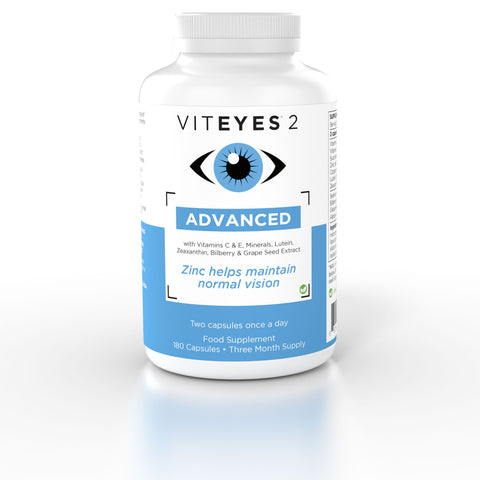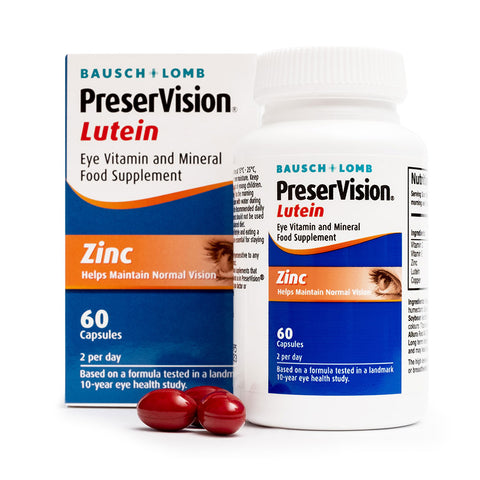About Macular Degeneration (AMD)
Macular degeneration (MD) or age related macular degeneration (ARMD or AMD) is the leading cause of permanent sight loss in the over sixty's.
As the population of older people grows, so will the number of new cases of AMD. There are two types of AMD, wet and dry. Dry AMD is more common and is the one that some of the vitamins on this site are intended for.
Where is the macula?
The macula is located in the centre of the retina, the light-sensitive tissue at the back of the eye. The retina converts light into electrical signals and sends these to the brain. It is the macular region of the retina which is responsible for detailed vision and colour perception.
What is age-related macular degeneration?
Age-related macular degeneration (AMD) is a disease that blurs the sharp, central vision you need for ‘straight-ahead’ activities such as reading, sewing and driving. It does not affect peripheral vision and does not cause any pain. There are two different forms of AMD: wet and dry.
Dry AMD
This is the more common form of AMD and accounts for about 90% of all cases. It develops gradually over time and usually causes mild to moderate loss of vision. Drusen, small fatty deposits, are a key sign of AMD and they accumulate at the central part of the retina in the tissues beneath the macula leading to thinning and drying. The extent of vision loss is related to the location and amount of thinning caused by the drusen. Dry AMD typically has three stages, which may occur in one or both eyes.
- Early AMD: people usually have several small drusen or a few medium-sized drusen. At this stage, there are no symptoms and no vision loss.
- Intermediate AMD: the retina now has many medium-sized drusen or one or more large drusen. Some people see a blurred spot in the centre of their vision and more light may be needed for reading.
- Advanced AMD: In addition to drusen there is a breakdown of light-sensitive cells and supporting tissue in the centre of the retina. This breakdown causes a blurred spot in the centre of vision which may get bigger and darker over time. Symptoms include difficulty reading or recognising faces until they are close to you.
The most common symptoms of dry AMD are: slightly blurred vision; difficulty recognising faces; needing more light for reading. Dry AMD generally affects both eyes, but vision can be lost in one eye more quickly while the other eye seems unaffected. Dry AMD may eventually develop into the wet form and cause more serious loss of vision, so regular eye examinations are still important.
Wet AMD
Although this accounts for only 10% of all AMD, the risk of severe sight loss is much greater. It is caused by the growth of abnormal blood vessels under the macula. These abnormal vessels leak fluid and blood into the tissue at the back of the eye, causing a blister to form in the retina. The resulting scar tissue leads first to distortion and eventually to loss of central vision. Wet AMD can rapidly damage the macula and result in a very quick loss of central vision. An early symptom of wet AMD is that straight lines appear wavy. If you notice this symptom or other changes to your vision, contact your eye care professional for a full eye examination.
How common is Age-related Macular Degeneration (AMD)?
Of those aged over 60, it is estimated that 25% have some degree of visual loss because of AMD, that equates to more than 3 million people in the UK. Only 38% of people have even heard of the condition, despite it being a leading cause of blindness. Risk factors include:
- Smoking
- Ageing
- Family History
- Female Gender
- Macular Degeneration Gene
- Prolonged Sun Exposure
- Hypertension
- Diets high in saturated fats
- Diets low in key anti-oxidants (rich green, leafy vegetables)
Smoking and AMD
Studies show that smoking was linked to a four-fold increase in the risk of developing AMD.
Is there any treatment for macular degeneration?
In certain cases of wet macular degeneration medical treatment can be very successful at either halting or in some cases reversing the vision problem associated with macular damage. Early diagnosis and treatment is usually key to achieving the best results which is why regular eye examinations are vital.
Anti-VEGF (vascular endothelial growth factor) treatments form the basis of the newest and currently most successful treatments. These involve a series of injections and are constantly being refined for improved treatment method and effectiveness. Photodynamic therapies and laser photocoagulation are two older but still used methods. In photodynamic therapy a light sensitive chemical is injected into the arm and then activated by a lower power laser. This chemical then destroys the new blood vessels which cause the damage within the eye. Laser photocoagulation is used to seal the leaking or bleeding vessels. It does not restore lost vision, but it may prevent further loss.
Although, there is no proven medical therapy for dry macular degeneration, nutritional supplements have been shown to be of benefit.
Nutrition and dry AMD
Several recent studies have indicated a strong link between nutrition and the development of macular degeneration. The research suggests that you may be able to delay and possibly prevent intermediate AMD from progressing to the advanced stage.
Age-Related Eye Disease Studies (AREDS and AREDS2)
The original Age-Related Eye Disease Study (AREDS) performed by the US National Institute of Health (NIH) started in 1996. It involved over 4,000 participants and found that specific high doses of Vitamins C and E, anti-oxidant carotenoid beta-carotene and the minerals zinc and copper (known as the AREDS formulation) lowered the risk of progression to advanced Age-related Macular Degeneration (AMD) by about 25 percent. Results from the second Age-Related Eye Disease Study (AREDS2) were announced in May 2013. This was looking to fine tune the original AREDS formula and investigate the effect of the key macular pigments lutein and zeaxanthin as well as omega 3 fish oils.
The study found that supplementing with omega 3 had no additional benefit but that replacing beta-carotene with lutein and zeaxanthin had an additional protective effect especially in those with poorer dietary intake of these ingredients. Therefore they have recommended a new formula for those at risk of advanced AMD:
- 10mg Lutein
- 2mg Zeaxanthin
- 500mg of Vitamin C
- 400IU of Vitamin E
- 25mg of Zinc
- plus Copper
How can I obtain these vitamins and minerals?
Increasing your intake of foods rich in these vitamins and minerals (such as fresh fruit & green leafy vegetables) will help. However, the high levels suggested may be difficult to achieve from diet alone. Therefore, taking a specifically designed food supplement containing the AREDS2 formula is an alternative. Although omega 3 was not shown to be of benefit in the AREDS2 study, dietary studies have shown that oily fish may be helpful. Therefore, including this in your diet may be potentially beneficial as well.
What Else Can I Do?
If you smoke, please stop or at least cut down. The NHS smokefree website can help. Smokers who receive weekly support from their pharmacy or surgery Stop Smoking Service are twice as likely to stay stopped.
Eat plenty of fresh fruit and vegetables, particularly raw or cooked spinach and kale. If your GP or ophthalmologist recommends a vitamin supplement to slow down the progression of your AMD, ensure it contains the AREDS formula.
They are unavailable on prescription due to updated prescribing guidelines issued to GP's in March 2018. These aim to save £400m from the annual drugs bill and now exclude most vitamins. It is important for you to contact us to check if they are compatible with your other medicines or medical conditions or if you have ever smoked. To help with treatment costs, we have multi-buy offers and run our own Direct Debit scheme that saves you 15% with free postage.
The use of magnifiers (which we stock), reading lights, large print books and technology such as that offered by the RNIB can help with reading and identifying food or medicines.
Join The Macular Society for newsletters, telephone helpline, research updates and local group activities. Reading about how other people manage their condition can be really useful in overcoming problems and staying positive.
When the time comes, register as partially sighted or blind through your ophthalmologist or hospital low vision clinic to receive financial assistance. If you drive, be sure to let DVLA know too.










